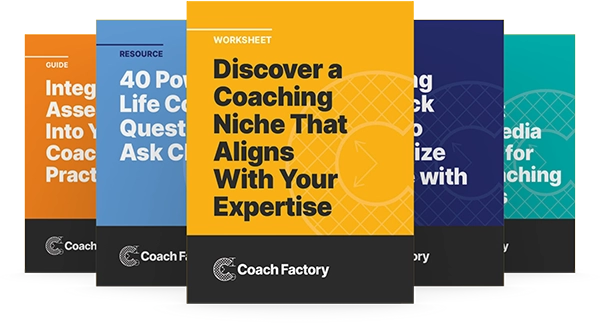Do you have a passion for helping others reach their full potential through targeted goal-setting? Are you a good listener and skilled at asking the right questions that help clients gain clarity and insight to move forward in their lives? If so, you may consider becoming a life coach. But what is a life coach, exactly?
As a life coach, you’ll have the opportunity to empower your clients to reach their full potential by providing guidance, support, and accountability. Life coaching is an incredibly effective way to transition your clients from where they are now in life, to where they want to be.
We’ll answer all of your questions about what a professional life coach does while making the necessary distinctions between coaching, therapy, consulting, and mentoring.
What Is a Life Coach?
Depending on their chosen niche, a life coach works with clients on personal growth, relationships, career development, stress management, and more.
Life coaches use various tools and techniques to help clients achieve their desired goals. The life coaching process typically involves one-on-one sessions in person or through virtual platforms, where the coach and client collaborate to identify objectives, establish strategies, and monitor progress. Life coaches provide a safe, non-judgmental space for clients to openly discuss their aspirations, challenges, and concerns, fostering self-awareness and personal development.
Under the law, life coaches have limitations. Even certified life coaches are barred from billing their services to health insurance companies, offering the medical care and services provided by therapists, or diagnosing and treating mental health conditions.
Comparison Chart: Coaching, Mentoring, Consulting, and Therapy
The information in the paragraphs below is compiled in this easy-to-absorb chart so you can quickly digest how these four common roles both overlap and stand apart.

Coaching vs. Therapy/Counseling
Counseling and therapy focus on treating mental health conditions such as depression or anxiety. In contrast, life coaching focuses on helping people move forward by identifying their goals and developing strategies for achieving them.
Coaching emphasizes personal growth, goal-setting, and achieving specific objectives in various areas of life, such as landing a better career or starting a new relationship. Coaches are primarily future-oriented, but they also focus on the present.
Therapists and counselors dive into clients’ emotional and psychological well-being by exploring experiences, past traumas, and underlying issues contributing to current challenges. Therapists work to help clients understand and resolve these issues to promote healing and improved mental health.
Unlike therapists and counselors, coaches are not licensed mental healthcare professionals who can diagnose and treat mental health conditions. During sessions, counselors and therapists use therapeutic techniques, such as cognitive-behavioral therapy or psychotherapy, to address clients’ psychological needs and create safe spaces for mental healing.
Coaching vs. Mentoring
Coaching and mentoring are both personal development approaches that are based on one-to-one conversations to enhance an individual’s skills, knowledge, or work performance.
Mentoring is a long-term relationship focused on the overall development of the mentee. Mentors provide guidance, support, and advice in various aspects of the mentee’s life or career by sharing their knowledge and personal experience to help the mentee grow and succeed.
The relationship between the coach and the client is usually more formal and structured in coaching. Mentoring involves a more informal, personal relationship between the mentor and the mentee. The mentor often takes on a nurturing role, acting as a role model. Mentees often seek mentors who have successfully navigated similar paths or faced similar challenges.
Coaching vs. Consulting
Consultants provide expert advice based on their knowledge and experience in a particular field or industry, whereas a life coach will work with clients across multiple areas of their lives simultaneously.
Coaching empowers individuals to identify their goals, develop strategies, and find their own solutions to challenges in various areas of their personal or professional lives. The primary objective of coaching is to facilitate personal growth, self-awareness, and positive change.
Conversely, consulting centers on providing expert advice and guidance to organizations or individuals to address specific problems, improve performance, or achieve business objectives. Consultants offer expertise in a particular field or industry, helping clients make informed decisions and implement effective strategies.
Consultants rely on their expertise, knowledge, and experience in their specific field. They analyze the client’s situation, identify issues, and provide tailored recommendations for their needs. Consultants often play an active role in implementing solutions and achieving results.
Coaches Are Part of a Helping Team
Ultimately each role has its strengths in helping people reach some type of goal involving their mental health. This goal could involve treatment or even the development of a master plan for succeeding in life despite any mental health disorders. Coaches, mentors, consultants, and therapists play an important part in helping the people who need them the most. In some cases, they even work collaboratively to achieve the same goals for their clients.
Whether your clients seek growth opportunities through life coaching or need guidance from an experienced mentor, there are many options available to fit individual situations and needs.


